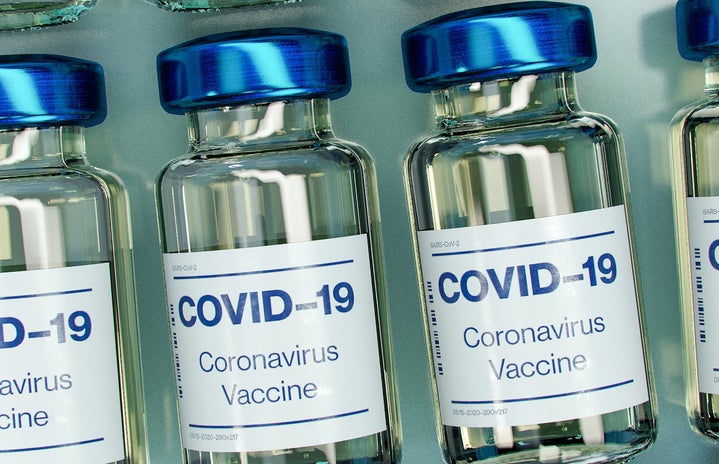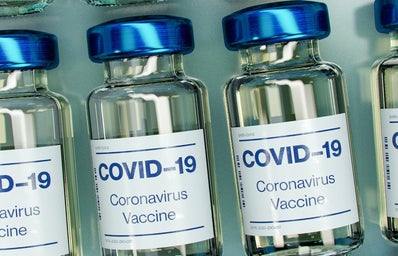I got my first dose of the Moderna vaccine a couple of weeks ago, and as much as I can’t say I enjoyed the feeling of the needle entering my arm, the relief that came after was enormous. I know that the first shot doesn’t automatically equate to being immune or safe from the virus (although that would be nice), but I also couldn’t quite wrap my head around this being the first solid and physical step in me helping our world recover from its most recent plague.
For so long, I’ve felt like the COVID-19 situation was hopeless and that quarantine and related safety measures would remain in place for the rest of time. Realistically, perhaps this wasn’t the most reasonable mentality, but after months of being shut inside, it’s definitely started to feel that way. And so, that sting of the first shot and step towards herd immunity felt pretty amazing. Of course, the side effects (sore arm and lethargy for me) were slightly less amazing, but it was 100% worth it.
This relief has continued to linger, even weeks after getting my first dose. I’m scheduled to get my second shot in a few weeks, and I’ve never been more excited to get stabbed in my life. This newfound confidence that things will and are getting better has also been paired with a craving to do things. I’m turning 21 shortly, and my brain considers “barhopping” more often than it probably should.

As amazing as it sounds, I’ve also needed to take a step back and acknowledge that getting the vaccine doesn’t necessarily equate to things being the same as pre-COVID. I’m still responsible (at least in part) for keeping the world safe until herd immunity is reached and the vaccine is more widely distributed. So, after I get the vaccine, do things go back to normal? While reading through some articles, I found Jennifer Clopton’s very simple response to be the best answer. “Not exactly.”
According to WebMD, 95% of people will be protected from COVID-19 after receiving two doses of Moderna or Pziser or a singular dose of J&J, and 100% will be protected from the more intense forms of the disease. However, 5% of people will, for some reason or another, be unable to create the antibodies needed to protect themselves, even with the help of the vaccine. They are still human beings, and their safety should be taken into account.
So, while the risk is low, these people can still get COVID after being vaccinated. There also hasn’t been enough research or data on whether somebody who’s vaccinated can still spread COVID to someone who is not. It seems to lower the likelihood of it happening, but there still seems to be a small level of risk (as is a theme with this d*mn disease).

According to Gupta (2021), “vaccines are one part of the prevention strategy.” Other examples include mask-wearing, social distancing and the ever-constant hand washing. As much as these precautions have given me mask-ne, loneliness, and consistently dry hands, it has also stopped me from getting the plague. So, even though life hasn’t been easy, I would like to continue this trend.
Getting my first dose of vaccine has raised my confidence in going out in public and has provided the hope I so need that things will be getting better. However, I’ve also tried to balance this newfound confidence with the knowledge that it may still be a while before things return to “normal.” My behavior and the behavior of others should reflect that.
The final takeaway is that even though having been vaccinated does mean it’s perfectly okay to breathe a sigh of relief, it also doesn’t mean we can completely return to business as usual. While in public, continue wearing a mask. Wash your hands with regularity and be aware that a portion of the population you are around still may not be vaccinated yet (or even if they are, it might not be fully effective).

For the sake of your personal health and the health of others, give your body the appropriate amount of time it needs to produce those beautiful little antibodies. For Pfizer and Moderna, these antibodies are in full effect two weeks after receiving both shots, the second of which should come a month after the first.
According to UCSF, someone who had received the J&J vaccine would be fully covered after 28 days, although data has shown that it is largely effective after two weeks and may continue to increase in efficacy after this. Basically, being aware of the time frame in which whatever vaccine you receive will be most effective is hugely important and should be taken into account prior to returning to the “real world”.
As much as I didn’t necessarily enjoy being poked with a needle, the thought that I’d safely be able to go out to eat at a restaurant once more has made it completely worth it (in addition to the safety and lives of people around me, of course). As I still have yet to receive my second dose, I haven’t allowed myself to change my behavior much but I look forward to doing so. The world is moving past the pandemic and as long as we all work together and remain cautious (no matter how much we may want to leap back into the world), things have been and are going to be getting a lot better.



